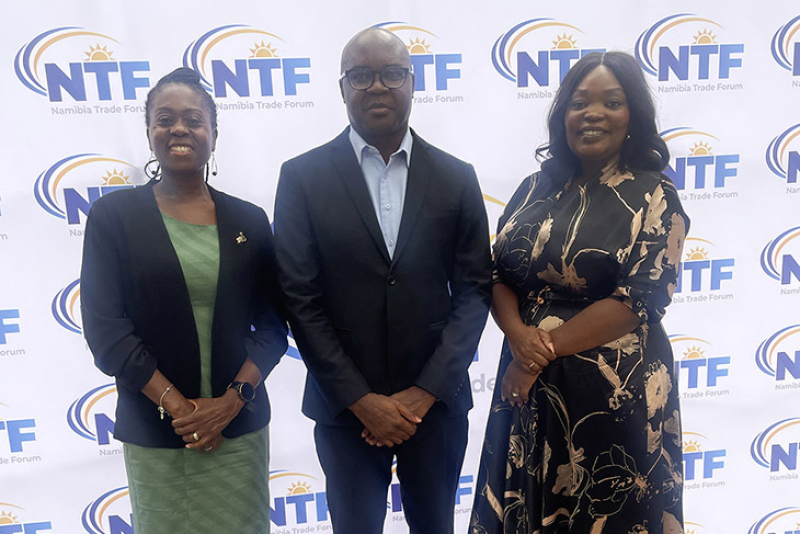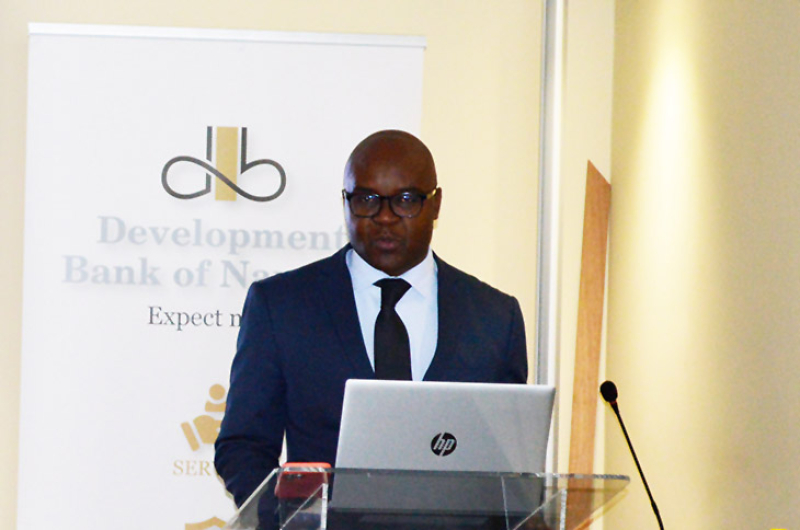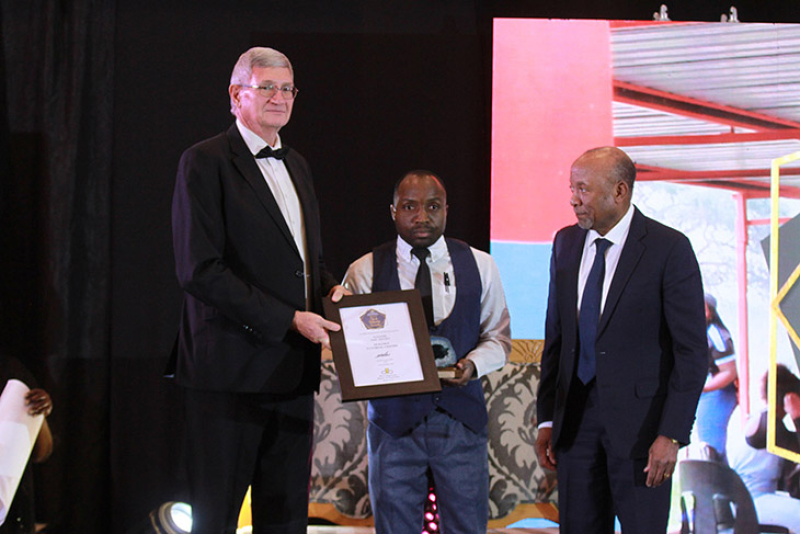 Call 061 290 8000
Call 061 290 8000 Click to mail us
Click to mail us FAQs
FAQs

DBN
NTF and DBN launched an MoU in terms of which NTF will assist export-oriented enterprises and start-ups to apply for DBN finance. The MoU will also cover enterprises engaged in internal trade.
Delivering the keynote address at the launch, Deputy Director for International Trade and Commerce in the Ministry of Industrialisation, Trade and SME Development, Ndiitah Nghipondoka-Robiati, said at a time when Namibia and the Africa continent are working towards greater integration this MoU, aims to improve and strengthen the SMEs and allows Namibia to accelerate its industrialisation agenda and diversify its export market.
Robiati reiterated that SMEs are the backbone of most economies and are a key source of economic growth dynamism and flexibility, so SME’s must engage in programs that foster entrepreneurial thinking and enhance entrepreneurship.
Robiati concluded that, collaboration such as the NTF-DBN MoU, and commitment and consistency are the three factors which will enable SME’s to become highly independent and increase their survival rate.
Stacey Pinto, CEO of NTF said that the collaboration is geared to strengthen applications for DBN by SMEs. NTF, she said, should be a first stop for SMEs intending to export goods or services to AfCTFA countries.
Among advice to strengthen DNB applications that NTF will provide, Pinto highlighted certain standards that will allow SMEs to compete in AfCFTA, elements such as packaging, labelling, barcodes, production capacity, and quality assurance. These elements, she emphasized, are the basis for SMEs to invest in products and services.
DBN CEO Martin Inkumbi highlighted the Namibian paradox of a highly developed enterprise financing and support ecosystem yet inefficient enterprise formation. This inefficiency is characterized by substandard performance of new and existing enterprises, as well as their failure.
According to Inkumbi the inefficiency is due to lack of entrepreneurial skills, limited demand for local goods and services, and lack of coordination in the enterprise financing and support ecosystem.
The MoU, he said, should be a model for coordination with the ability to assist finance for manufacturing, food processing, agriculture infrastructure with the goal of local and AfCFTA trade.
He cautioned that although AfCFTA represents a potential boom for Namibian exporters, it also opens Namibia to imports, and so it is important for Namibian SMEs and manufacturers to be competitive in both local and export markets.
Inkumbi concluded by expressing hope that the partnership would be energetic and effective.
The Bank has announced the approval and implementation of a Business Rescue Programme for qualifying businesses financed by the Bank as a possible alternative to liquidation. The programme takes the form of partial conversion of debt into various types of preference shares to be held by the Bank in the enterprise and the deployment of independent business managers to such entities to render technical and management advisory services.
Speaking about the programme DBN CEO, Martin Inkumbi, said that the combination of prevalent unfavourable economic fundamentals have left many businesses at the point where they are barely able to operate. The Bank has a duty to recover its capital so that it can make further loans to other borrowers. However, the Bank responsibly also strives to strike a balance to preserve the envisaged development impact.
Inkumbi illustrated this point by saying that the Bank gives regards to employment opportunities created, income for owners, preservation of owners’ capital and assets , contributions to local, regional and national economies, and continued economic growth as reasons to attempt to preserve businesses. The Bank, he stressed, does everything it reasonably can to preserve businesses that it has financed and, where possible, creates a win-win situation for the borrower and the Bank.
Explaining the programme in detail, Inkumbi said DBN will in the next few weeks appoint independent business rescue advisors through a transparent procurement process. Once an advisor is appointed to carry out an assessment of a distressed business, the advisor will make recommendations on the turnabout strategy. The turnabout strategy will identify changes that need to be made to the operation of the business, its governance and / or its capital structure.
If the capital structure is not appropriate, the Bank could consider converting part of the debt to the Bank into alternative patient financing instruments such as convertible preference shares.
Inkumbi went on to say that preference shares give the Bank the ability to relax its repayment requirements for a portion of the loan in anticipation of growth of value and yields on the shares. Owners, he said, would always have the first right to repurchase the shares or, with the agreement of DBN, to arrange for the sale of the shares to third parties.
During the period which the Bank holds preference shares, the business will be contractually obliged to meet a number of milestones identified by the advisor and agreed between the business and DBN.
Once the business is on its feet again, DBN will exit the preference share arrangement, preferably by selling its preference shares back to the original owners.
The first task of the business turnaround advisor, Inkumbi elaborated, will be to ascertain if the business can be rescued. If not, the Bank will have to begin steps to recover its loans through the normal liquidation process. If the business can be rescued, the advisor will make recommendations on management, capital structure and governance which the enterprise will be contractually obliged to implement. In some cases, control of the management of the business could be transferred to mutually agreed business managers with expertise to help manage the enterprise out of a loss making position.
Where changes to the business’s capital structure (i.e. the debt to equity ratio) are required, the advisor will be able to either assist with bringing equity investors on board or to recommend the conversion of DBNs debt to preference shares. Through this conversion, DBN will hold preference shares in the business for a limited period only. The aim is always for the Bank to exit and transfer full ownership and control of the business to its owners or new investors or a combination of both.
Asked about resistance to the advisors, Inkumbi said the programme is voluntary. There will be consultation between the Bank and the distressed business owners. Where a distressed business owner is not willing to accepted terms and conditions of a rescue program, they can always opt to repay the Bank’s loan or alternatively face liquidation.
Inkumbi stated that the terms of reference for independent advisory services have been drawn up, and they emphasize high degrees of experience and skills. The Bank believes that some businesses fail due to poor management and lack of financial control.
On the topic of eligibility, Inkumbi said that not all businesses in distress would qualify or meet the criteria of the business rescue program. There must be some level of business activities happening and revenue generation. Ideally such a business must be in a position to at least partially meet its loan repayment obligation to the Bank. The Bank will not convert full debt into a preference share instrument. The owners must also be committed and willing to make further capital investment and meet the Bank halfway.
Although this is a rescue programme, it is an opportunity for businesses to make strides towards a sustainable future, Inkumbi concluded.
The Development Bank of Namibia (DBN) hosted its prestigious 2022 Good Business Awards in Windhoek on the night of 3 November 2022. Officiated over by the Vice President, His Excellency, Dr. Nangolo Mbumba, the event was attended by leading lights in Namibia’s private sector.
The event delivered wins for land servicing and education, with strong showings for tourism, manufacturing and transport and logistics.
Winner of the SME category, Zealous Tutorial Centre provides tutorial services to grade 10 and 12 learners in Rundu, enhancing secondary school educational outcomes. Finalist Infinity Logistics operates in the transport and logistics sector, one of the sectors identified in NDP5 as being critical to Namibia’s economic sustainability and development. Finalist Blue-Chem Investments manufactures cleaning products in Walvis Bay. Manufacturing has been identified as an important sector for Namibia’s future economic activity.
Winner of the large enterprise category, Otweya Land Developers serviced land for the large neighbourhood development at Rocky Crest Extension 4 in Windhoek. Lack of serviced land is a barrier to economic activity, socio-economic wellbeing and formation of capital.
Finalist San Kaross Lifestyle Safari developed San Kaross Lodge at Daan Viljoen, near Windhoek. Tourism and hospitality operations such as San Kaross are major emplores and earners of foreign currency. Finalist and specialist educator International University of Management (IUM), prepares and equips managers for roles in Namibia’s public and private sectors.
In his welcoming remarks, Chairperson of the DBN Board, Sarel van Zyl said through its finance of sustainable enterprises, the Bank seeks to achieve a high degree of economic activity and resulting development impact, as the economy recovers, and in future as the economy bears fruits.
He noted that the first Good Business Awards took into consideration job creation, local sourcing, sustainable and innovative use of resources, sound administration of the enterprise and good governance. Those judging criteria for these awards remains the same, and the finalists and winners epitomise that.
In his keynote address, Dr. Mbumba said his message to the finalists and winners is one of encouragement and their presence is an indication of excellence. He described them as agents of development and highly valuable components in the enterprise ecosystem.
Describing the relevance of the Awards, DBN CEO Martin Inkumbi said good business consists of enterprises and initiatives that are appropriate to the Namibian economy, that satisfy demand in the market and that are well administered. Good businesses are also those that can adapt to changing circumstances and economic shocks, as we have seen in the last two years. Good businesses also use their resources to accumulate capital either to grow, to evolve or to buffer themselves against economic shocks.
He said the concept of good business is ideal however, it also challenges Namibia. Namibia has traditionally been a tied economy dependent on regional linkages. It is influenced by neighbouring economies through the economies of scale that those economies achieve and subsequent imports that tend to dominate Namibia. It is also influenced by regional economic mechanisms such as SACU and the SADC.
The counters to this, he continued, are firstly to develop greater local self-sufficiency, and secondly to develop greater export capacity. Implicit to this is the need for sustainable enterprises that will endure through the years, providing consistent supply of high-quality goods and services through the years.
Good business, he pointed out, requires development of entrepreneurial culture, at the level of the enterprise as well as at a national level. The Good Business Awards showcase the best enterprises financed by the Bank. They are sustainable, they satisfy needs in the market and the economy, and they are administered for long-term success. However, the finalists and winners also set examples for other businesses. By examining their models and practices, other businesses can learn what it takes to succeed.
The Bank also learns from its finalists and winners. They become a standard against which the Bank can gauge its borrowers, both in the application phase and in the support that it can offer to its existing borrowers, he concluded.





